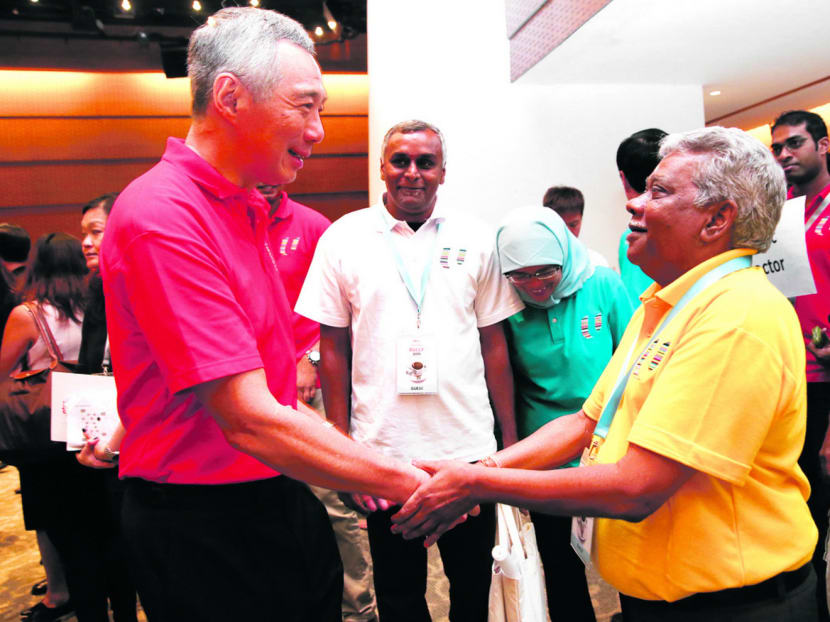Strong govt-union ties ‘unique to Singapore’
SINGAPORE — Angry speeches and demonstrations are no longer a part of Labour Day here but the bond between the Government and unions, forged from the days of Mr Lee Kuan Yew, have endured, said Prime Minister Lee Hsien Loong yesterday.

PM Lee with union leader G Muthukumarasamy during the May Day Rally yesterday. PM Lee said he felt proud Mr Muthukumarasamy could stand equal to former leaders to share stories of the late Mr Lee. Photo: Don Wong
SINGAPORE — Angry speeches and demonstrations are no longer a part of Labour Day here but the bond between the Government and unions, forged from the days of Mr Lee Kuan Yew, have endured, said Prime Minister Lee Hsien Loong yesterday.
The late founding Prime Minister had declared in Singapore’s first May Day Rally in 1960 that the Government was on the workers’ side, PM Lee recounted to an audience of 4,000 unionists and tripartite partners yesterday at the 56th annual rally to mark Labour Day.
The strong relationship between unions and the Government cannot be found in any other country, and “nowhere else has such a bond lasted so long”, PM Lee added.
The late Mr Lee began his political career in the unions, fighting for postal workers in 1952 as he led them in a successful strike. He became legal advisor to over 100 trade unions and associations, before forming the People’s Action Party and triumphing in the 1959 General Election.
Labour Day was first declared a public holiday in 1960 and, at the rally at Jalan Besar Stadium, Mr Lee said May Day that year would always be a notable occasion in the history of the trade union movement in Singapore. “For this is the first time that May Day is celebrated in Singapore when there is a government which is openly on the workers’ side,” the late Mr Lee had said.
PM Lee noted that in some countries, governments champion workers’ interests but often pursue policies that frighten off investors and damage the economy.
Workers then lose their jobs and kick the government out, he said. Other governments try to weaken unions and conflict results in gridlock and lose-lose outcomes, he said.
Here, the Government, workers and employers may not agree all the time but there is give-and-take because each party trusts the others to take a longer-term collective interest, PM Lee said.
He added that the model in Singapore is not easily replicated because the societies and histories of other countries are different and they do not have the long tradition of the Government delivering the goods for workers.
Criticising Opposition politicians who claim that tripartism is obsolete and that unions must adopt an adversarial stance against the Government and employers, PM Lee said: “Either they really don’t understand that without tripartism, we would not be here today. Or maybe they understand, but they are not interested in workers’ welfare; they are just trying to foment trouble, to exploit workers for their own political ends.”
Reiterating why the Government recommits itself to workers every year, PM Lee spoke of unionist G Muthukumarasamy’s eulogy at Mr Lee’s funeral.
The Prime Minister said he felt proud that the General Secretary for Amalgamated Union of Public Daily Rated Workers could stand equal to presidents, former ministers and leaders to share personal stories of his late father.
“Kumar represented where Mr Lee started in politics, what he fought for all his life, the kind of society that he sought to build, and did build,” said PM Lee, choking back tears.
The late Mr Lee — who died on March 23 — was a fierce, powerful mobiliser in his young days, but there are no longer angry speeches or shouts on May Day because Singapore is in a stable and constructive state, said PM Lee.
“It’s good that we have changed gears because if we have a revolution all the time, we have turmoil and upheaval, in the end you get nowhere. We’ve changed gears, we’re building (on what has been achieved) but, to build, we also need the passion and energy,” he said.






